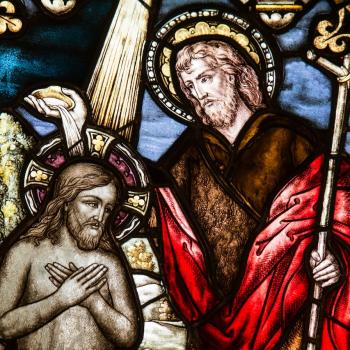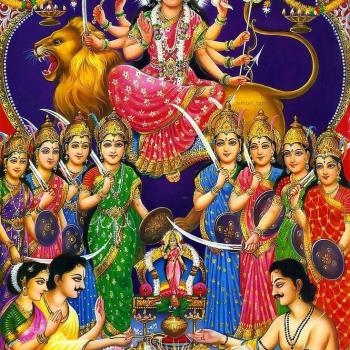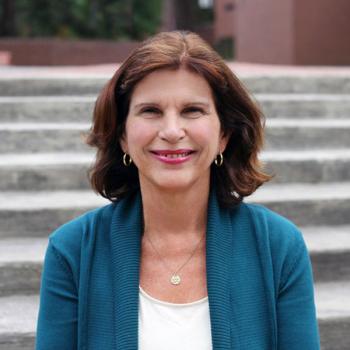Human beings are difficult to get along with under most circumstances, as those of us in a faith or wisdom community know, and at one point it looks as though all three members of our hunting party will go their separate ways. But when Mattie finds Tom and falls into the clutches of him and the gang of outlaws sheltering him, our heroes rise to their better natures, and grace comes into the picture. The wonderful scene where Rooster Cogburn turns around and rides into a hail of gunfire to rescue Mattie is no less important than LeBoeuf's return, and much less important than Rooster carrying the snake-bit Mattie through the night in his arms to get her to safety. Early in the movie he has belittled Mattie by calling her "Little Sister"; by movie's end, he has grown into the realization that she is his sister, and accepted that she requires his care. Moreover, this connection and community gives meaning in lives with too few connections; both characters remember these few days together to the end of their lives.
The King's Speech is a "based on actual events" film that comes with the usual low-grade controversies about factuality. I typically dismiss these in a good movie: no matter which parts of the movie are historically true, it's all emotionally true. King George VI (played here by Colin Firth) did have a serious speech impediment, he did work with Lionel Logue, an Australian speech therapist (played by Geoffrey Rush), and their interaction was essential not just for the king to become a better speaker, but to become a better king, and a better human being. The scenes where the two of them face off shimmer with energy, tension, and, ultimately, grace. In a very real sense, their interaction makes King George into the person the world needs him to be—and is a taste of love and beauty in Lionel's life as well.
A couple of weeks ago I heard a beautiful ordination sermon from Michael Curry, the Bishop of North Carolina, one of the great preachers in the Episcopal Church. He made reference to the essential role of the therapist in The King's Speech, and said it was a priestly role; he said that my friend being ordained (and all priests, pastors, and pastoral people) needed to become Australian speech therapists! By this, he meant that she (and they) needed to help people to find their voices, to speak out courageously, and to live into their responsibilities.
Some people have been disappointed that the Church (represented in the film by Derek Jacobi's Archbishop of Canterbury) is not the agent of the king's transformation, but I tend to think of "church" a little more liberally these days. Where love is present, where people are being called to their highest and best, where challenge and encouragement are offered alongside each other, we're seeing something beautiful and sacred, even if no one is wearing a funny hat. That's what human interaction—what community—helps us do. Without Queen Elizabeth (Helena Bonham Carter in a dowdy but inspiring role), without Logue, King George could not have stepped up to a microphone, could not have called his people to stand firm against the Nazi menace, and the whole world would have suffered as a result. I too wish for our faith communities to be the agents of positive change in the world and in the lives of individuals, and this movie helps me desire that even more. And it reminds me: We need each other.
No film this year proves that more than Toy Story III, which has no chance to win as Best Picture, although many reviewers have named it one of the best pictures of 2010. My screenwriter friends and I agree that the Pixar films are generally among the best-written films in Hollywood, and that holds true for this second Toy Story sequel as well. Woody (Tom Hanks) and Buzz Lightyear (Tim Allen) are still the heroic central characters, but what's important is that they are the central figures in a larger community, and that they find their ultimate meaning in relationship.
What does it mean to be a toy if your owner doesn't play with you any more? (Or, to put it in human terms, what does it mean when you've done something your whole life, and now nobody wants you anymore?) You can become bitter, angry, alienated, as Lotso Hugging Bear (Ned Beatty), the movie's villain does. You can use people instead of loving them. Or you can decide that whatever happens, you're going to experience it in community, which is what the toys decide. Good times or bad times, live or die, if you are with the people you love, if you are with the people who believe in you, then anything can be faced. Even the end.
I was one of many grown-ups who teared up at the end of Toy Story III—an animated sequel about toys—and I'm not ashamed to say it. This year, as every year, I need to be reminded about the importance of community. I need to hear it from the pulpit, I need to hear it from my car speakers, and I need to hear it in story after story. What I find in these films this year reminds me that I am on a journey with other people, that I am diminished when I think that my desires should be paramount, and that only in community can I attain lasting joy and peace.
I don't know if Hollywood needs a hug, but I do.
And this year, I feel like these films provided it.





